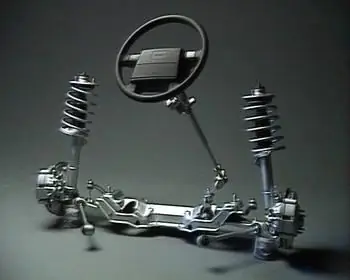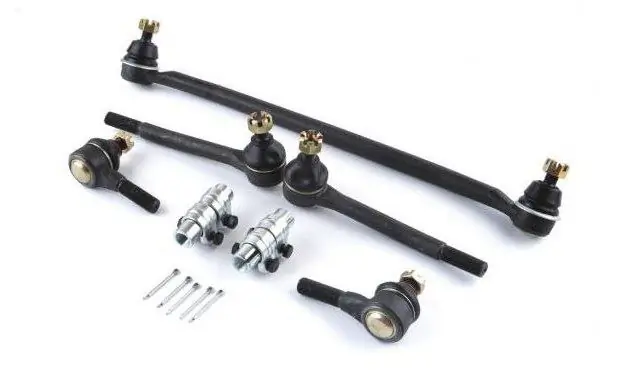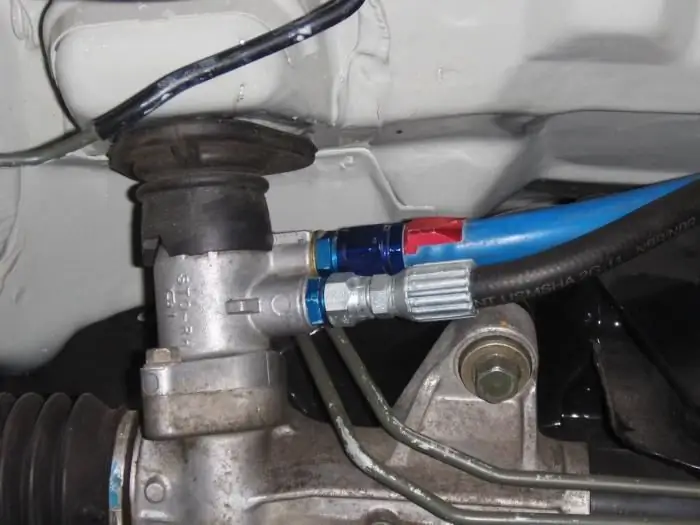2026 Author: Erin Ralphs | ralphs@carsalmanac.com. Last modified: 2025-01-22 21:14:11
Many would agree that the engine is the backbone of the car. And indeed it is. However, it is also difficult to imagine a car without steering. This is an important and necessary element in every car. The task of steering is to ensure the movement of the vehicle in a given direction. This node consists of several components. These are the steering wheel, column, drive and steering gear. We will talk about the latter today.
Functions
The steering mechanism has several main tasks:
- Transmission of forces to the drive.
- Increasing the force applied by the driver to the steering wheel.
- Automatic return of the steering wheel to the neutral position when the load is removed.
Varieties
This element can be of several types. Today there are the following types of steering mechanisms:
- Rack.
- Worm.
- Screw.
Whatrepresents each of them? We will consider all these types of mechanisms separately.
Racket
At the moment it is one of the most common. It is mainly installed on cars and crossovers. The rack and pinion steering mechanism requires the following parts:
- Gears.
- Reiki.

The first was mounted on the steering shaft. The pinion is in constant mesh with the rack. This mechanism works quite simply. When the steering wheel is turned, the rack moves to the right or left. At the same time, the rods that are attached to the drive turn the steered wheels at a given angle.
Among the advantages of such a mechanism, it is worth noting the simplicity of design, high efficiency and high rigidity. However, at the same time, such a mechanism is very sensitive to bumps in the road, which is why it wears out quickly. Often, used car owners are faced with the problem of a knocking rack. This is a consequence of the wear of the steering mechanism. Therefore, the element is installed only on certain types of cars. Basically, these are front-wheel drive cars with independent front suspension. If we talk about the VAZ, then the rail is found on all models, starting with the G8. On the “classic”, a slightly different steering mechanism is installed.
Worm
This is the type used on domestic Zhiguli, as well as on some buses and light trucks. This node consists of:
- Globoid-type worm withvariable diameter.
- The steering shaft to which the worm connects.
- Reel.
There is a bipod outside the steering mechanism. This is a special lever that is connected to the drive rods. The steering mechanism on the GAZ-3302 is arranged according to the same scheme.

Among the advantages of such a node, it is worth noting less sensitivity to shock loads. Therefore, this steering mechanism, installed on the VAZ-2107, is practically eternal. Owners rarely experience knocking and vibrations on the steering wheel. However, this design scheme has more connections. Therefore, periodically the mechanism needs to be adjusted.
Screw
This is a more complex node in the device. Its design includes:
- Screw. Located on the steering wheel shaft.
- Nut. It moves over the previous element.
- Toothed rack.
- Gear selector. It is connected to the rail.
- Tieback arm. Located on the selector shaft.
The key feature of this mechanism is the way the nut and screw are connected. Fastening is carried out using balls. Thus, less wear and friction of the pair is achieved.
The principle of the screw element is similar to the worm. The steering wheel is turned by turning the screw, which moves the nut. The latter moves the gear sector with the help of the rack, and with it the steering arm.

Where is the screw mechanism used? Often, it is used on heavy commercial vehicles -trucks and buses. If we talk about cars, then these are only executive class models. The mechanism is more complex in device and expensive, therefore, it significantly increases the cost of the car itself.
Amplifier
Now almost all cars use power steering. It serves to reduce the effort required to turn the front wheels. This element allows for high precision and speed of steering. At the moment, there are several types of amplifiers:
- Hydraulic.
- Electric.
The first type is more popular. Fits both cars and trucks. The amplifier device has a pump that creates a certain pressure in the hydraulic system. Depending on the side of the steering wheel, this fluid presses on the first or second rack circuit. Thus, the force required to turn is reduced. Among the advantages of the hydraulic system, it is worth noting high reliability. The amplifier rarely fails. However, since the pump mechanism is driven by the crankshaft, some power is taken from the internal combustion engine. Although on modern engines it is completely invisible.

The electric booster consists of a separate motor. The torque from it is transmitted to the steering wheel shaft itself. The design is used only on passenger cars, as it is not designed for high forces.
EUR is equipped with separate electronics, whichcontrols this engine. Sometimes the amplifier is equipped with adaptive systems that are aimed at increasing safety when driving along the lane.

Among the innovative solutions, it is worth noting the dynamic control system from Audi. Here the gear ratio changes depending on the current vehicle speed. Thus, at high speeds, the steering is hard and knocked down, while when parking it becomes light. The gear ratio is changed using a double planetary gear that is added to the shaft. Its body can rotate depending on the speed of the vehicle.
Conclusion
So, we found out what this mechanism is. This is a very responsible node in the steering. Regardless of the type, it must be checked periodically. After all, losing control at speed is the most dangerous thing that can happen to a driver.
Recommended:
The steering column is an important element of the driving mechanism

Many motorists believe that the steering column is not a very complex and important part of the car, and do not pay enough attention to this element of the control system. And in vain
Steering trapezoid: device, purpose. Vehicle steering

The steering trapezoid on the "seven" consists of tips and central thrust. This mechanism ensures smooth and synchronous turning of both front wheels. The forces applied by the driver to the steering wheel are transmitted through the column to the gearbox. The latter allows you to convert the movement using a worm gear and rotates the steering knuckles through the steering rods
Steering rack "Renault Megan-2": features, device. Replacing the steering rack "Renault Megan-2"

Steering is a mechanism by which the car moves in the direction set by the driver. According to the owners of Renault Megan-2, repairing the steering rack is a rather time-consuming process: removal alone can take an hour. And the most problematic part, the sleeve, often breaks during dismantling and creates problems with its removal
Power steering (GUR) is an important and practical mechanism of any car

Hydraulic power steering (GUR) is a very significant detail in the design of a modern car. At the moment, almost all foreign cars are equipped with this mechanism. Why are they there, even domestic cars have such a device
Steering technique: turning the steering wheel when turning. Creaking, crunching when turning the steering wheel, what do they mean

Few drivers think about, for example, how correctly they hold the steering wheel, considering this an unimportant nuance that does not affect the quality of driving; Or what should be the turn of the steering wheel when turning. In fact, there is a whole technique for handling the steering wheel

